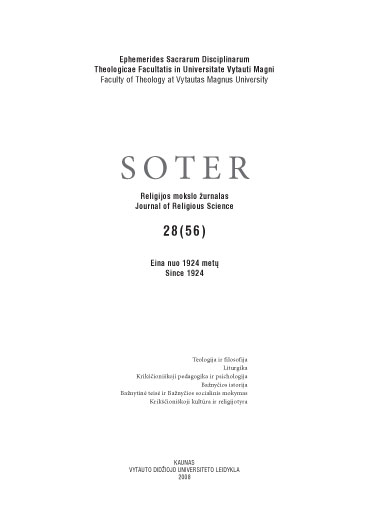
ACTUS AND MOTUS IN THE PHILOSOPHY OF THOMAS AQUINAS
Veiksmas ir judėjimas šv. Tomo Akviniečio filosofijoje
Keywords: šv. Tomas Akvinietis; judėjimas; judėjimo filosofija; motus; actus; veiksmas; St. Thomas Aquinas; movement; philosophy of movement; motus; actus; action.
This essay is the description of the investigation which is a part of my studies of the philosophy of movement. The method of description was partly motivated by the wish to stay as close as possible to the actual process of investigation. Therefore, it should be noticed that actual readings of St. Thomas Aquinas works looking for answers to questions concerning philosophy of movement took place. I understand this process as the research in the most proper sense of the word. Because the search of the concept of motus in St. Thomas works was essential for this re-search. Another aspect of the investigation was the presupposition which was the effect and conclusion of my unpublished Master Thesis. The idea of the Thesis was to compare the concept of movement in Aristotelian and Cartesian philosophies and to ask whether differences of the concept of movement affect ethical concepts explicated or implied in Aristotelian and Cartesian philosophies. I found that the differences in philosophy of movement in Aristotle and Descartes strongly affected their ethical thinking. According to philosophers of science the shift in philosophy of movement took place in the Middle Ages. Ten I found that some authors who interpret St. Tomas Aquinas philosophy, for example, Anzenbacher are closer to dualism of Descartes that universalism of Aristotle. Anzenbacher explaining philosophy of St. Thomas Aquinas affirms that the sphere of the concept of motus is confined by natural philosophy and the sphere of the concept of actus - by practical philosophy (e.g. history and human actions). In this essay I make effort to prove that it is misinterpretation of the philosophy of St. Tomas Aquinas. Therefore I started to question whether this shift in philosophy of movement was inspired by St. Thomas Aquinas. In the works of St. Thomas Aquinas I found that in most aspects he keeps to Aristotelian definition of movement as actus imperfectus. Motus remains strongly connected to the concepts of actus and potentia as in Aristotle. St. Tomas preserves the universality of both concepts – motus and actus. Nevertheless, he claims that action (operatio) of the human soul is proper to a human being. In such way St. Thomas claims that more narrow concept of the human activity (operatio humana) should be distinguished for the sake of preserving more general concept of actus. Another interpretation of philosophy of actus referring to St. Tomas Aquinas was developed by Karol Wojtyla. Remaining in the tradition of division between motus and actus as paralleled to division between the human body and human action, Wojtyla acknowledges the impossibility to reduce the concept actus humanus to the concept of actus. This irreducibility shows that the old Aristotelian tradition of philosophy of movement in spite of many deliberate and non-deliberate attempts cannot be reduced to the Platonic or Cartesian dualism. As a consequence, on the one hand, it is suggested that the tradition of interpretation
More...
